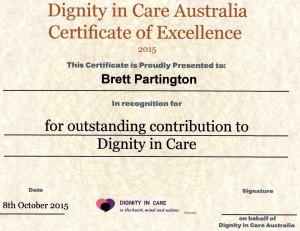
Ralph is a farmer. He was involved in agriculture at the highest level. He now has late stage dementia, schizophrenia, has tremors and hot sweats and uses a walking frame to shuffle around. He eats pureed food and drinks out of a feeder cup(cup with built in straw) He is also forced to wear a degrading bib most of the day.
Ralph would be wheeled into Men’s Group each Thursday and he would watch the other residents participate in games and activities. Ralph was a person that I personally found confronting. He grunted and would shake or nod his head to communicate and he was in a very sad state within his world between that walking frame. I must say I tended to ignore Ralph originally as he was in the “too hard basket” for me. I was inexperienced with dementia and I treated him like the rest of society would, I ignored him. I would say “hello Ralph” which was my token effort then I would spend the rest of the time with the other residents (which I am not proud of).
I watched other carers wheel him in each week, give him a cordial and then just clean up his front from time to time. I was more comfortable working with the other residents who could communicate better and were more agile. I started to review the group each week and I suddenly realised that Ralph was not actually participating at all. He was simply being pushed into position then pushed back to his room.
As the weeks went on we did less and less for Ralph and we did not even ask him to participate as we assumed he couldn’t or wouldn’t. This was a very big mistake and this poor man was being lost to the system, and I was letting it happen.
I then put myself in his shoes and saw life from Ralph’s angle. I imagine he would feel lonely, ignored, helpless, pitied, frustrated, not valued, and just plain sad. I was now on a mission to get Ralph in the game.
The following week we played indoor carpet bowls and I needed to work out how Ralph can play the game if he is seated and has limited hand movement. I found a pvc pipe and laid it on his chest and placed a ball in his curled up shaking hand which had several fingers missing as well. He slowly placed the ball in the top of the pipe and released it. The excited look on his face when he let that ball go was priceless. I changed as a person in that split second.
Ralph was now ‘in the game…and in the moment”. We loaded him up again and gave him extra shots almost out of guilt to make up for all the weeks he was ignored.
He became really animated and excited. The fact he was using a very straight piece of pipe not only got him in the game, it also allowed him to win every game….he never missed. This would then upset the other residents and 94 yo ‘Feisty Fred’ would fire up by saying “it’s cheating using that bloody thing!”.
From that moment on I vowed to myself that we will not be playing another activity with this group unless Ralph is actively involved. Over the next 4 weeks I came up with 4 more games that could be played in a seated position. Ralph would now eagerly wait for his turn and try really hard to win the game. What was really special was that Ralph had never previously engaged with any other resident in the nursing home. He now began to shakily applaud them when they did a good shot. This is engagement!
What Ralph taught me was that everyone has something to offer, but they just have to be given the opportunity. As carers we need to embrace the challenge to care for someone that may be difficult, and not take the easy road. As a community we need to reach out to people like Ralph, try harder and not give up on them














 Facebook
Facebook Twitter
Twitter LinkedIn
LinkedIn